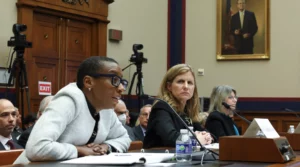
Jackie Hajdenberg
PHILADELPHIA — On Monday afternoon, as the front page of the student newspaper broadcast that the school’s president had resigned, Elan Roth was sitting at the University of Pennsylvania Hillel studying for finals.
It had been a whirlwind few days for Jewish students at the Ivy League campus. The previous Tuesday, their president, Liz Magill, had declined to say clearly that calls for the genocide of Jews violated school rules. On Saturday, she stepped down. Monday was the last day of classes, and exams begin Thursday.
Amid all of that, Penn’s Jews have had to contend with a swarm of journalists asking for their thoughts on antisemitism at their university. Students said that at the end of Shabbat, after the news of Magill’s exit broke, a crowd of reporters was waiting outside of Hillel to get students’ reactions. Roth appeared on CNN the next day.
“At the end of the day, it’s just been really distracting,” Roth, a junior majoring in mathematical philosophy, said. “It’s been unfortunate that we have to put a lot of mind power and effort into figuring out why there’s these feelings of antisemitism on campus. It’s been really difficult to concentrate on school normally.”
Magill’s resignation is the latest stage of a rolling antisemitism controversy that has been brewing at the school for months — and Jewish students were still digesting it. Roth feels it will be, “hopefully, a step in the right direction,” while other students mentioned fears of backlash or averred that they feel safe on campus. But all who spoke said that they’re more concerned about antisemitism from their peers than the question of who sits in the president’s office.
“It’s a little bit of a weight off to know that there’s accountability going on now,” said Sadie Waldbaum, a junior at Wharton studying finance and business analytics. “At least that’s being seen. However, I wouldn’t say I feel safer, because the problem is the professors and students on campus who are perpetuating these ideas and false narratives.”
She added, “Even though she’s resigned, there’s still a lot of work to be done to just change the trajectory of Penn as well as schools across the country.”
Magill’s response to antisemitism has been in the spotlight all semester. In September, the Penn administration drew criticism for a Palestinian culture festival that included speakers accused of antisemitism, such as Pink Floyd frontman Roger Waters. The campus also experienced antisemitic vandalism. The school announced policy changes, but days afterward, Hamas’ Oct. 7 attack on Israel and ensuing student activism drew a fresh wave of attention to campus antisemitism, placing renewed scrutiny on Magill and the administrations of other elite schools.
Penn formed an antisemitism task force, and soon afterward was hit with a federal complaint alleging that the university was an unsafe environment for Jewish students. Then Magill was invited to testify on the issue before Congress along with the presidents of Harvard University and the Massachusetts Institute of Technology. All three said their response to calls for genocide of Jews would depend on “context.” Days of criticism from students, alumni and Pennsylvania’s Jewish governor — and a donor threatening to withdraw a $100 million contribution — preceded Magill’s announcement.
(Penn’s board chair, Scott Bok, also resigned on Saturday. Bok’s position will be filled in the interim by Julie Platt, a Penn alum who also serves as chair of the Jewish Federations of North America.)
Maya Harpaz, a junior at Penn, member of the Hillel executive board and member of Penn’s antisemitism task force, wrote in an email that she welcomed the resignation and “will continue to monitor the situation.”
“The change in leadership is a good start to restoring our campus community, but there is much more that needs to be done to ensure that the Jewish community at Penn is safe,” she wrote.
In the meantime, Jewish life at the school — which has 1,600 Jewish students among a total undergraduate population of about 10,000, according to Hillel — is continuing apace. On Monday on Locust Walk, the main campus thoroughfare, Jewish alumni and parents handed out jelly donuts for Hanukkah just feet away from a student distributing copies of the Daily Pennsylvanian, the student newspaper, featuring a front-page spread on Magill’s resignation.
The previous night, the Penn Jewish a cappella group, the Shabbatones, performed a traditional Jewish prayer for peace at the White House in Washington, D.C.
Akiva Berkowitz, an Orthodox student who wears a kippah, said he feels “completely safe on campus.”
“I do think it’s important for people to recognize that campus remains safe, and people continue to go to Hillel and proudly be Jewish,” Berkowitz said. “And it’s not as if we’re cowering down because of what’s happening around. We’re standing up proudly, and we’re on Locust and we’re doing our own rallies and we’re out there.”
Berkowitz agreed that the focus needs to be on changing policies to address what he views as threatening chants. He hopes to see “better guidelines of what constitutes open expression and what constitutes hate speech.”
“I’m less interested in the administrative and who’s in charge and more about: are the issues on campus being addressed, and are we able to really crack down on people who are calling for Intifada, calling for genocide against Jews?” Berkowitz said. “Can we really address that and make sure that they mete the punishments that they deserve?”
Waldbaum added that she’s worried about the trajectory of events — Magill resigning following a threat from a donor — playing into antisemitic stereotypes.
“A lot of the reactions that I’ve seen have been like, ‘The Jewish donors control the school’ and just feeding into antisemitic tropes of, ‘Jews control the media’ and ‘Jews control this’ and stuff like that, which is definitely not great either, because, while obviously the donors do have influence, this was a broader moral issue that needed to be dealt with,” she said.
Still other Jewish students oppose the resignation as a threat to student activism. Hilah Kohen, an Israeli-American doctoral student enrolled in the comparative literature and literary theory program, told the Daily Pennsylvanian, “Far-right political figures who align themselves with actual neo-Nazis may use these resignations to repress campus protests against the active, blood-curdling genocide of Palestinians.”
Waldman, who wears a small Star of David necklace, said the Penn Jewish community is “incredible” and that she feels safe on campus, even though this semester has been tense. She added that generally, a lot of her energy is taken up not with fighting bigotry but with the everyday concerns of student life.
“I have to deal with it. And I have to go to school and I have to do my classes,” she said. “When I went home for Thanksgiving, I think I realized, ‘Wow, I’ve really been dealing with so much and I don’t even realize it because I’m just going through the day-to-day and dealing with it.’”






